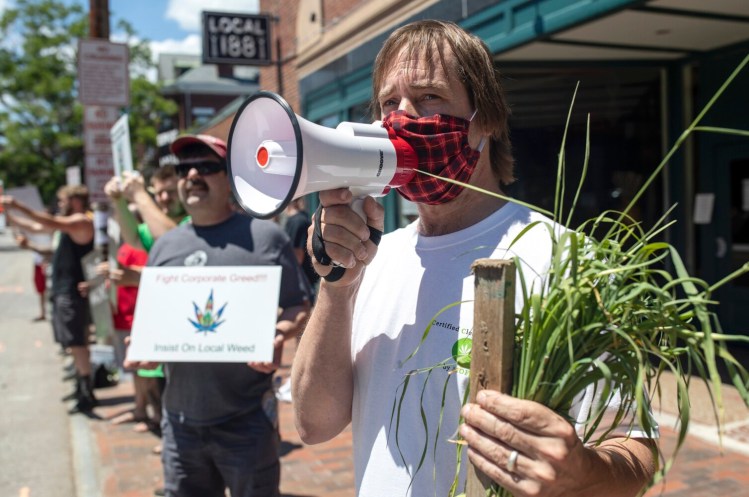Dozens gathered outside the medical cannabis dispensaries of Maine’s largest marijuana company Friday to protest its efforts to use the courts to open the Maine market to out-of-state competition, a tactic that locals fear will drive them out of the industry and taint the state’s reputation for producing craft cannabis.
Led by marijuana activist Dawson Julia of Unity, the Maine Cannabis Coalition staged four protests at Wellness Connection of Maine dispensaries in Brewer, Gardiner, Portland and South Portland, which, when taken together, represent half of Maine’s registered dispensaries. The company is owned by out-of-state investors that also control two of Maine’s other dispensaries.
The protests were triggered by Wellness Connection’s successful legal challenge of Maine’s state marijuana law, which required a recreational marijuana business license owner to be a four-year Maine resident, and its pending challenge of Portland’s cannabis ordinance, which gives residents an advantage in landing one of the city’s 20 retail shop licenses.
“Wellness is trying to buy its way into the (recreational) market, using corporate lawyers to rewrite the rules to fit the Wall Street business model,” said protester Kevin Brown, who works at Humble Family Farms, a Lewiston medical cannabis company. “This is Maine. We do everything craft, from our beer to our woodworking. We don’t want corporate cannabis.”
At its peak, the Portland protest drew about 50 people waving signs and shouting “Keep it local!” on bullhorns to the sidewalks of upper Congress Street outside Wellness’ flagship store. They waved signs reading “Local Weed, Not Corporate Greed,” and “For Sale – Maine’s Elected Officials,” and “You are supporting the Wal-mart of Cannabis” in 87-degree heat. Protests also drew more than two dozen people in Gardiner and 20 in Brewer.
Maine Cannabis Coalition is comprised largely of medical marijuana providers, which include those registered by the state to sell marijuana to a handful of registered medical marijuana patients as well as larger caregiver businesses that have opened one of the estimated 350 medical marijuana shops throughout Maine in the past three years.
Wellness staff in Portland was unfazed by the protest, watching from afar while the protesters interacted with passing motorists.
“Wellness Connection has been advocating for quality, clean, consistent Maine cannabis since 2011, and we remain committed to improving cannabis industry standards,” said general manager Charlie Langston by email. “We value the great relationships and collaborations that we’ve forged over the years with Maine’s best caregivers, cannabis artisans and cultivators.”
Wellness would like to sell recreational marijuana at its Congress Street dispensary, but Portland’s scoring matrix puts it, an out-of-state business owned by High Street Capital Partners LLC of Delaware, at a significant competitive disadvantage because local applicants get a bonus for residency and local business experience.
Wellness cited the interstate commerce clause of the U.S. Constitution in its legal challenge to Maine’s residency requirement for state marijuana business licenses. The lawsuit claimed part of the state law discriminated against out-of-state applicants such as Wellness. The company withdrew the challenge after the state agreed not to enforce the requirement.
Maine Cannabis Coalition has filed a lawsuit of its own in hopes of forcing Maine to enforce that part of the law.
Dave Whitten, the owner of Sticky Bud Farms in Windham, said he holds out little hope that Maine will change its mind over the residency requirement, but he came out to protest in Portland to educate consumers about Wellness’ legal tactics. Whitten called Wellness a greedy corporation that is putting Maine’s craft cannabis reputation at risk.
“I want people to know exactly what Wellness is doing,” Whitten said. “What they’re doing, trying to smash the little guy, it’s really not right. It’s not what people voted for in the referendum. We voted for legal marijuana, yeah, but we also voted for Maine jobs, Maine profits. We voted for Maine cannabis.”
Lawyers that represent Wellness have argued that residency requirements can hurt Maine’s craft cannabis companies, too. Such requirements can prohibit Maine companies from seeking capital infusions from out-of-state investors, they argue. The Wellness shops also partner with many craft operators across Maine who would rather grow cannabis than sell it.
Send questions/comments to the editors.




Success. Please wait for the page to reload. If the page does not reload within 5 seconds, please refresh the page.
Enter your email and password to access comments.
Hi, to comment on stories you must . This profile is in addition to your subscription and website login.
Already have a commenting profile? .
Invalid username/password.
Please check your email to confirm and complete your registration.
Only subscribers are eligible to post comments. Please subscribe or login first for digital access. Here’s why.
Use the form below to reset your password. When you've submitted your account email, we will send an email with a reset code.